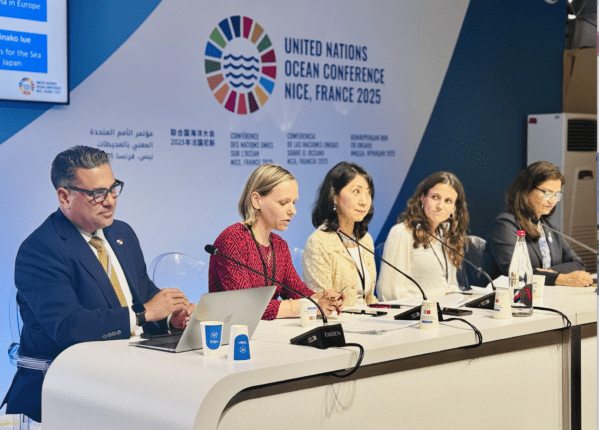-
Three Takeaways From the Third UN Ocean Conference
July 10, 2025 By Carolyn Gruber
“There cannot be a healthy planet without a healthy ocean. It’s urgent business for us all,” said U.N. special envoy for the ocean, Peter Thomson, at last month’s UN Ocean Conference (UNOC).
Hosted in Nice, France, the conference brought together more than 15,000 political leaders, scientists, civil society, the private sector, academic institutions, Indigenous peoples, local communities, and philanthropic organizations with the goal of identifying innovative ways to finance and mobilize action for the ocean.
With 60 world leaders and 190 ministers in attendance, the conference marked a pivotal moment for global ocean governance. Hosted by the Governments of France and Costa Rica, the third UNOC sparked a wave of high-level political commitments and interdisciplinary momentum. The Nice Ocean Action Plan is an important step forward – but turning its ambition into impact will require sustained political will, accountability, and long-term investment. Among the many takeaways from the conference, three themes stood out:
1. Multilateralism is doing just fine, thanks.
Eighteen countries ratified the High Seas Treaty in Nice, bringing the total to 50 — just 11 shy of the 60 ratifications needed for it to enter into force. This landmark agreement is the first legally binding framework to protect marine biodiversity in international waters and is critical to achieving global biodiversity goals by 2030.
The Treaty is a rare example of a truly global, long-term solution. After more than 15 years of negotiations, Member States and stakeholders have come together around a shared plan to safeguard the global ocean commons. But the race is now on to ratify. Only countries that do so before the first Conference of the Parties (which must occur within 120 days of the treaty entering into force) will have a seat at the table to shape how the treaty is implemented — including key decisions on governance, financing, and organizational structure. The risk of being sidelined from key decisions is real, so we’ll be tracking who moves next.
Notably absent from UNOC3 was the U.S. government, which had played a prominent role in the first two UN Ocean Conferences and in shaping the High Seas Treaty. Still, UNOC3 proved to be an action-forcing event that rose to the moment, reaffirming the value and relevance of multilateralism. Former Secretary of State John Kerry remarked that the U.S. has “stepped back from its traditional role by reversing [ocean] protections,” while emphasizing that “other nations can seize the mantle of critical leadership.”
2. “One word: Plastics.”
As the ocean community prepares for the next (and presumably final) Intergovernmental Negotiating Committee on the Global Plastics Treaty in Geneva next month, plastic pollution was top of mind in Nice and the Mediterranean Sea, where 1.6 million pounds of plastic waste find their way each day.
“The stakes for the ocean are high, and only getting higher, especially when it comes to plastic pollution,” said Monica Medina, Stimson Center Board member and former U.S. Assistant Secretary for Oceans, Environment and Science at a panel hosted by the Stimson Center and the Governments of France and Greece. Since 1950, global plastic production has grown from 2 million tons to more than 400 million tons and is on track to double again by 2040.
“It feels like the statistics [on plastics] are endless, but so is our ambition,” said Medina.
The Mediterranean is a perfect testing ground to tackle plastic pollution regionally, said Dr. Yasmine Fouad, Minister for the Environment for Egypt. “We’re lucky because in the Mediterranean because we have established governance, we have that sense of [shared] civilization and culture that brings the 22 countries together.”
The plastic problem will require more than regional cooperation or industry action, however. A seismic shift in behavior will be necessary to unlock real, measurable progress in reducing plastic pollution. Experts from around the world are pushing hard for communities to fundamentally rethink their relationship with plastic, with an eye towards a circular economy.
3. The cost of inaction is not slowing, and the blue finance gap is growing.
The mood at UNOC3 made it clear that the ocean community is activated, engaged, and motivated. Unfortunately, the interest in supporting UNOC’s priorities of defending ecosystems and building a sustainable blue economy is far outpacing a critical ingredient: blue finance. Today, just $1.2 billion per year supports ocean protection. That is a fraction of the $15.8 billion needed annually to protect 30% of the ocean by 2030.
At the Blue Economy and Finance Forum held in Monaco the weekend before the UNOC, public and private investors gave a much-needed jumpstart to the conversation, pledging $10 billion in new blue finance. But to create a truly regenerative blue economy, more funding is needed, and faster.
Resilient oceans are necessary to sustain generations to come. As the fifth largest economy in the world, the ocean drives global growth by creating jobs that underpin $2.6 trillion in annual economic activity and supporting food security for more than 3 billion people. With deadlines for multiple global environmental goals swiftly approaching, whether the 1.5 degree target, 30×30, or SDG14, translating lofty ocean ambition into well-financed, accessible, community-led, science-based ocean action is more critical than ever.
Sources: Blue Economy and Finance Forum, Ellen MacArthur Foundation, NOAA, OECD, United Nations
Photo Credit: Panelists at the side event on “Transparency, Will, and Progress: The Pillars of Action and the IUU Fishing Action Alliance,” hosted by Fisheries and Oceans Canada. From left to right, Gerardo Irimia Arosemena (Government of Panama), Vanya Vulperhorst (Oceana), Minako Iue (Sailors for the Sea), Amélie Giardini (Environmental Justice Foundation), and Soledad Tapia Almonacid (Government of Chile).
Topics: circular economy, climate change, climate finance, conservation, environment, fishing, IUU, meta, oceans, plastic, SDGs, UN
 A Publication of the Stimson Center.
A Publication of the Stimson Center.








